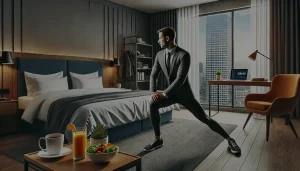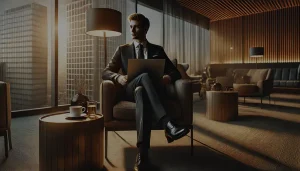Table of Contents
The experience of traveling for work can be as challenging as it is rewarding, especially when it comes to the well-being of executives who need to balance long hours of meetings, commuting and leisure time. Amidst this intense routine, the search for environments that promote relaxation and revitalization has gained prominence in luxury hotels, which have been investing in innovative solutions to transform guests' stays. In this scenario, the combination of aromatherapy and music therapy has stood out as a trend capable of creating unique and personalized sensory experiences, providing benefits for both physical and mental health.
The Profile of the Modern Executive and the Search for Balance
Contemporary executives live at a fast pace, demanding not only professional performance, but also the ability to find moments of disconnection and balance during their travels. The intense routine, marked by different time zones, consecutive meetings and tight deadlines, generates a wear and tear that can impact both the productivity regarding quality of life. Therefore, the demand for solutions that promote relaxation and stress relief has increased significantly.
In luxury hotels, this trend is reflected in the creation of environments dedicated to well-being, where integrative therapies, such as aromatherapy and music therapy, are used to offer a sensory retreat. These approaches not only help to alleviate the effects of fatigue and anxiety, but also contribute to improving the quality of sleep and the mood of guests. Renowned companies, such as Four Seasons and The Ritz-Carlton, already implement wellness programs that include these therapies, demonstrating how investing in health and comfort can generate positive results for business.
Challenges and Impacts on the Executive's Life
During business trips, executives face challenges such as jet lag, stress from professional activities and adapting to different environments. This set of factors can impair concentration, decision-making and, consequently, performance at work. Case studies conducted in large hotel chains reveal that environments prepared with specific care for relaxation and emotional decompression contribute to improving guest performance, generating a virtuous cycle of well-being and productivity.
Furthermore, investing in quality experiences plays an important role in building customer loyalty, as customers begin to value not only excellent service, but also concern for their health and quality of life. Executives who feel well-served and understood tend to recommend and return to these establishments, creating a relationship of trust and exclusivity that is highly valued in the luxury hospitality market.
Aromatherapy: The Power of Scents in Transforming Spaces
Aromatherapy, based on the use of essential oils extracted from plants, has been recognized for decades for its therapeutic and relaxing effects. This technique acts in a subtle but effective way, stimulating the sense of smell and directly influencing the emotional and physical state of individuals.
Concepts and Benefits of Aromatherapy
In practice, aromatherapy involves diffusing specific scents that can help reduce stress, improve mood and even promote more restful sleep. Essential oils, such as lavender, eucalyptus and bergamot, are widely used for their calming and energizing properties, depending on the needs of the environment and the moment. By stimulating the limbic system – the part of the brain responsible for emotions – aromas can trigger responses that promote relaxation and well-being.
Practical Applications in Hotel Environments
In luxury hotels, aromatherapy has been integrated into various spaces to create a welcoming and personalized atmosphere. For example, spa areas and reception rooms relaxation uses essential oil diffusers to create an ambiance the place with specific fragrances, providing guests with a sensory experience that transports them to a state of calm and tranquility. Some establishments go further, personalizing the room experience with aromas that adapt to the guest's profile, creating a unique and exclusive connection.
Case Studies and Real Examples
- The Ritz-Carlton: This renowned hotel chain has invested heavily in personalizing the experience of guests. In its relaxation areas, the use of aromatherapy is a constant, where the scents are carefully selected to convey feelings of serenity and luxury. The environment, prepared with the use of natural essences, helps to reduce accumulated stress and provide moments of introspection and recovery during the stay.
- Mandarin Oriental: Another notable example, the Mandarin Oriental uses aromatherapy as a tool to improve the quality of guests’ sleep. By applying specific essential oils to the rooms, the hotel chain creates an atmosphere conducive to rest, helping to regulate circadian rhythms and promoting deeper, more restorative sleep.
Music Therapy: Harmony and Rhythm for Mind and Body
Music therapy is another approach that has been gaining prominence in high-end environments, especially in hotels that seek to offer differentiated and memorable experiences to their customers. By using music therapeutically, this technique works to reduce anxiety, elevate mood and create an environment conducive to relaxation and concentration.
Principles and Benefits of Music Therapy
The practice of music therapy goes beyond the simple pleasure of listening to good music. Based on scientific studies, this technique recognizes that music has the power to modulate emotions and directly influence the physiological state of the individual. Music with certain rhythms and tones can lower blood pressure, reduce cortisol levels (stress hormone) and stimulate the release of endorphins, the happiness hormones.
Implementation in Luxury Hotels
In high-end establishments, music therapy can be integrated in a variety of ways to enhance the guest experience. One of the most common practices is the creation of themed playlists that accompany different moments of the stay, such as check-in, rest time or even spa sessions. This musical curation, often created with the help of experts, aims to create a harmonious and balanced environment, where each note and each chord contributes to the feeling of well-being.
Real Examples and Innovative Approaches
- Four Seasons Hotels: Known for its attention to detail and personalized services, the Four Seasons chain has implemented music therapy programs that accompany spa sessions. At some hotels, guests have the opportunity to participate in interactive sessions where music is used as a tool for meditation and relaxation, helping to reduce anxiety and promote a state of mind of clarity and focus.
- Bulgari Hotels & Resorts: In an innovative move, Bulgari Hotels & Resorts is focusing on personalizing the sound experience in its spaces. Each space is decorated with soundtracks that reflect the design and atmosphere of the place, creating a symbiosis between the visual aesthetic and the auditory experience. This careful integration of music and ambiance results in a unique experience, where guests are immersed in a universe of sensations that raise the standard of comfort and exclusivity.
The Synergy Between Aromatherapy and Music Therapy: A Holistic Experience
The combination of aromatherapy and music therapy has the potential to enhance the benefits of each technique, providing a truly holistic experience. By combining aromas and sounds, luxury hotels are able to create environments that stimulate all the senses and promote a deep sense of relaxation and balance.
Integration of Sensations and Combined Benefits
When the calming effects of aromas meet the transformative power of music, the results can be surprising. This synergy works in a complementary way: while aromas act directly on the limbic system, music has the ability to regulate emotions and create rhythms that follow the listener's state of mind. Together, these therapies can enhance the feeling of well-being, providing moments of introspection and renewal.
Examples of Practical Application
- Hotel Bel-Air, Los Angeles: A clear example of the integration of these therapies can be seen at the Bel-Air Hotel, which offers exclusive packages for executives. In this environment, aromatherapy and music therapy sessions are combined to create spaces for meditation and relaxation. Guests enjoy carefully prepared environments, where the combination of soothing aromas and relaxing soundtracks generates a complete sensory experience, capable of relieving stress and revitalizing the mind.
Guest Benefits and Competitive Advantages
This integrated approach not only improves each guest’s individual experience, but also creates a competitive edge for hotels that adopt it. In an increasingly demanding market, offering a service that goes beyond the conventional and that cares about the emotional and physical health of guests can be the decisive factor in building loyalty and recommending the establishment.
Strategies for Implementing These Therapies in Luxury Hotels
Incorporating integrative therapies into luxury hotels requires careful planning and the collaboration of specialized professionals. It is essential that each step is thought through to ensure that the benefits of the therapies are fully enjoyed by guests.
Service Planning and Development
The implementation of these therapies begins with a clear definition of the objectives and needs of the guests. Hotels that wish to adopt aromatherapy and music therapy must invest in market research and specialized consultancy to identify which aromas and types of music best suit the profile of their guests. This step involves:
- Guest Profile Analysis: Identify the main demands and preferences of executives staying at the establishment.
- Selection of Specialized Professionals: Hire therapists and wellness consultants who can create and implement personalized protocols, ensuring the quality and effectiveness of treatments.
- Development of Custom Environments: Adapt the hotel spaces – from rooms to common areas, spas and meditation rooms – so that the integration of sensory elements is harmonious and effective.
Differentiation and Positioning in the Market
In addition to technical implementation, it is important for hotels to clearly and transparently communicate the benefits of these therapies to their guests. Communication campaigns that highlight the service's differentials, customer testimonials and case studies can reinforce the hotel's image. hotel as a reference in wellness experiences.
Inspiring Examples
- Aman Resorts: Recognized for its attention to detail and offering exclusive experiences, Aman Resorts has developed campaigns focused on holistic experiences. The approach used by the chain highlights the importance of an environment that promotes balance and connection between mind and body, highlighting the positive impact of these therapies on the quality of life of guests.
- Strategic Partnerships: In addition to internal campaigns, luxury hotels have formed partnerships with renowned brands and experts in the wellness segment. These partnerships not only reinforce the credibility of the services offered, but also enable the creation of exclusive packages and experiences that add value and attract a demanding and selective audience.
Business Impacts and Results
The results of integrating therapies such as aromatherapy and music therapy go beyond the well-being of guests, directly reflecting on the commercial performance of hotels. The adoption of these practices can lead to:
Increased Guest Satisfaction and Loyalty
Environments that promote relaxation and emotional balance have a positive impact on customers’ perception of the service provided. Executives who experience aromatherapy and music therapy sessions report a significant improvement in their mental state, which translates into more positive reviews and a feeling of exclusivity and care. This satisfaction tends to drive loyalty, transforming occasional guests into repeat customers.
Improvement in Performance Indicators
In addition to increasing customer satisfaction, studies and case reports show that offering integrative services can directly influence indicators such as the occupancy rate and average ticket of establishments. Hotels that invest in differentiated experiences are able to stand out in the market and attract an audience willing to pay a higher price. premium for services that add value to your stay.
Examples and Relevant Data
- Luxury Hotel Case Studies: Research conducted with guests of renowned chains, such as The Ritz-Carlton and Mandarin Oriental, indicates that the perception of an environment carefully prepared to promote well-being is directly linked to greater satisfaction and, consequently, greater loyalty.
- Executive Reports: In interviews and testimonies, several executives claim that, after experiencing aromatherapy and music therapy sessions, they felt a notable reduction in their stress levels and a significant improvement in the quality of their sleep, which allowed them to resume their activities with more energy and focus.
Impact on Brand Positioning and Image
Offering exclusive sensory experiences not only improves financial results, but also reinforces the hotel’s positioning as an environment that values the health and well-being of its guests. In a competitive market, this differentiation can be crucial for winning new customers and maintaining an image of excellence and innovation.
Reflections and Perspectives for the Future of Luxury Hospitality
The current luxury hospitality landscape indicates that the trend is to increasingly invest in personalized experiences that meet the individual needs of guests. The combination of aromatherapy and music therapy represents a natural evolution in this context, offering a holistic approach that integrates body and mind.
Technological Innovations and Personalization of Service
With the advancement of technology, personalizing environments and adapting services to guests’ preferences have become increasingly feasible. Sensors, applications and integrated systems can be used to monitor individual preferences and automatically adjust environments – from the intensity of aromas to the selection of soundtracks – creating a unique and exclusive experience for each visitor.
The Role of Data and Research in the Evolution of Services
The continuous collection and analysis of data on the guest experience allows hotels to Constantly adjust and improve their services. Satisfaction surveys, feedback and behavioral studies help identify which aspects of integrative therapies are most valued by customers, enabling continuous evolution in the service offering. This data-driven approach is essential to maintain competitiveness and relevance in the luxury hospitality market.
Long-Term Vision and Sustainability of Wellness Services
The integration of therapies such as aromatherapy and music therapy is not just a passing trend. On the contrary, it reflects a paradigm shift in the way well-being is conceived and delivered. Hotels that invest in holistic experiences are not only meeting current demand, but are also preparing for a future where health and quality of life will be central elements in the choice of accommodation service.
An Invitation to Reflection and Transformation
The incorporation of aromatherapy and music therapy in luxury hotels goes beyond simply offering differentiated services – it represents a commitment to transforming the hotel environment into a space where well-being, balance and quality of life are priorities. By providing complete and personalized sensory experiences, these establishments not only stand out in the market, but also contribute to improving the health and emotional state of their guests.
The benefits of these therapies are evident both physically and emotionally, generating a positive impact that is reflected in every detail of the stay. Executives who find moments of relaxation and introspection amidst the hustle and bustle of their routines have the opportunity to recharge their batteries and resume their activities with greater energy and focus, demonstrating that investing in well-being is, above all, investing in productivity and quality of life.
In a society that is increasingly aware of the importance of balance between body and mind, the integration of therapeutic approaches in hospitality environments high standard is consolidated as a strategy that transcends luxury and becomes an essential competitive differentiator. This transformation is the result not only of technological innovations and personalization services, but also a change in mentality that values health and well-being as fundamental pillars for personal and professional success and satisfaction.

Cosmopolitan executive, business travel consultant and luxury hotel lover, Alexander Belmont shares exclusive insights into premium experiences in metropolises around the world.




